
Solving the Home Charging Reimbursement Challenge: How MoveEV and Geotab Make It Simple
MoveEV has partnered with Geotab to solve one of the most complex challenges in fleet electrification: reimbursing drivers for at-home EV charging. With over 3,000 utilities in the U.S., reading and reconciling each driver’s bill has historically been a logistical nightmare, often falling on drivers or administrators to manage manually. But MoveEV’s proprietary AI technology make hyper-accurate reimbursemen easy.

Why MoveEV’s Direct Pay Feature Matters So Much: Insights from CBRE’s Amy Allen at Geotab Connect
Eliminate out-of-pocket costs and streamline home charging reimbursement with MoveEV’s Direct Pay feature. During Geotab Connect 2025, CBRE’s Amy Allen shared how this innovative solution is helping fleets overcome one of the biggest challenges in EV adoption—ensuring accurate, timely, and tax-free reimbursements for drivers.
🔎 Learn how MoveEV’s Direct Pay puts money back into employees’ pockets faster and simplifies fleet electrification.

MoveEV Joins Geotab’s Order Now Program to Simplify Home Charging Reimbursement for EV Fleets
Geotab customers can now add home charging reimbursement for electric fleet vehicles with a few clicks - directly inside the Geotab Marketplace. MoveEV joins Order Now to make ev fleet management easy.

MoveEV Unveils Stipend vs. True Cost Calculator to Help Fleet Managers Cut Costs on At-Home EV Charging
If your organization is offering fleet drivers in electric vehicles a stipend or flat fee for charging at home, you are making a mistake. Not only does this result in 30%+ going to the government in the form of taxes, but the resulting “take home” sum drivers actually receive can be significantly less than they spend on electricity - resulting in disgruntlement but also, depending on where they live, legal liability for your organization. See how much your organization has to gain by making the switch to a true cost method with this simple tool.

AFLA Email: Best Practices For Home Charging Reimbursement For EV Fleets
MoveEV was featured in this month’s Automotive Fleet & Leasing Association (AFLA) Best Practices newsletter, spotlighting Home Charging Reimbursement for EV Fleets. As more fleets go electric, figuring out how to reimburse employees for charging at home is no longer just a nice-to-have — it’s essential to reducing costs and streamlining EV operations. We’re proud to be leading the charge (pun intended!) with ReimburseEV™, making home charging accurate, hassle-free, and scalable. Check out the feature and learn how we’re helping fleets save money and accelerate their EV adoption.

MoveEV Selected For Plug and Play Detroit’s Prestigious Batch 5
MoveEV has been selected as one of ten startups for Plug and Play Detroit's Batch 5, joining an innovative mobility technology program backed by Stellantis, BorgWarner, and MMSDC. This milestone underscores MoveEV’s mission to revolutionize home charging reimbursement for electric vehicles. As part of this esteemed cohort, MoveEV will collaborate with industry leaders and explore new partnerships to advance sustainable mobility solutions. Learn how this opportunity enhances MoveEV’s ability to accelerate the EV transition by addressing critical challenges for fleets and municipalities.

To Build or Not to Build Workplace EV Charging Stations? Why There’s No Simple Answer
CleanTechnica’s article, "To Build or Not to Build Workplace EV Charging Stations," explores the complexities of installing workplace EV chargers. While demand for charging infrastructure is growing, companies must weigh the costs, space limitations, and actual employee needs. Surveys can help employers assess demand and optimize charging solutions, including offering home charging reimbursements to reduce workplace pressure. This balanced approach encourages EV adoption while managing costs and infrastructure challenges.
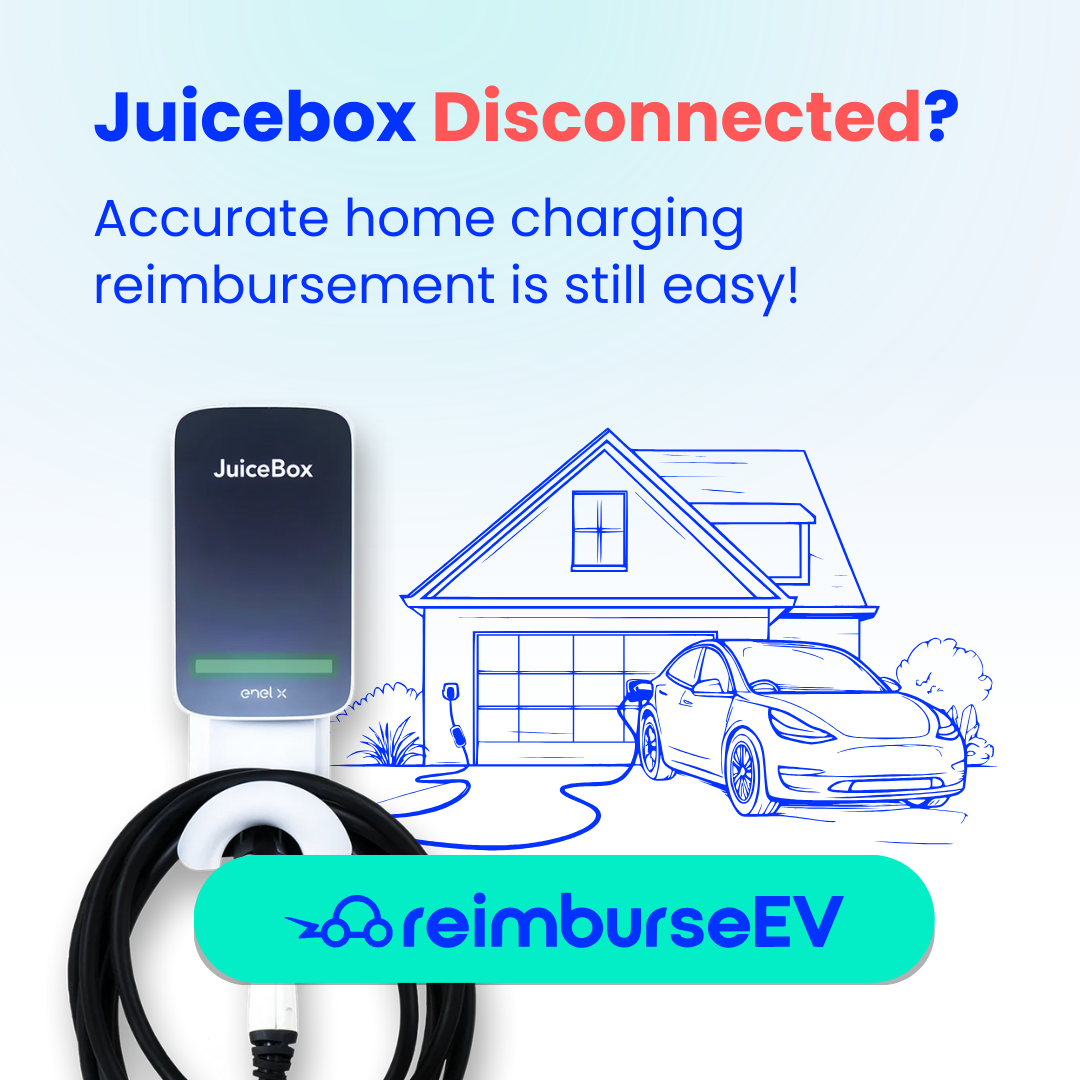
Ensuring Uninterrupted EV Charging Reimbursements Amid JuiceBox Service Shutdown
As JuiceBox EV chargers phase out in the U.S. and Canada by October 11th, many fleet managers and EV owners may face disruptions in app services for charging and data tracking. At MoveEV, we’re here to ensure your home charging reimbursement process remains seamless. Our ReimburseEV™ solution works with all charger types—regardless of the brand—so you can continue accurate EV charging reimbursements without interruption. Whether you're using a JuiceBox or another system, our platform ensures you won't need costly hardware upgrades. Reach out to learn more about how we can keep your operations running smoothly!
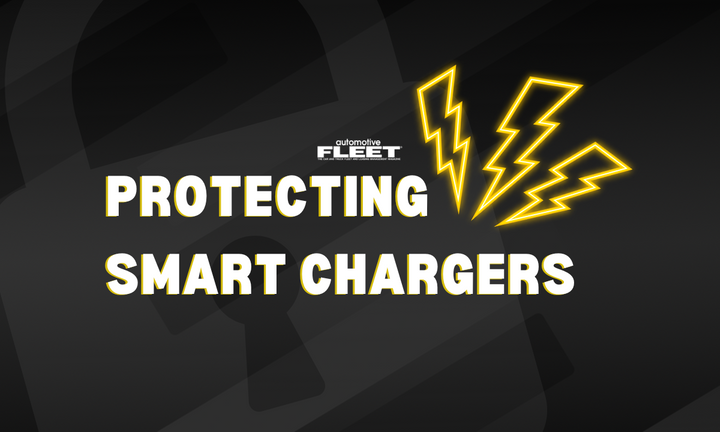
Networked “Smart” Chargers Pose a Bigger Security Risk Than Companies Realize
In the Automotive Fleet article, experts raise alarms about the hidden cybersecurity risks that networked smart EV chargers present to companies. As fleet electrification grows, businesses increasingly rely on these smart chargers, but many overlook the serious security vulnerabilities embedded in their connected systems. Hackers could potentially use these chargers as entry points to access corporate networks, siphon off sensitive data, or even disable critical infrastructure. The article emphasizes that failing to secure these devices could lead to significant operational disruptions or financial loss.

ReimburseEV™: The Answer to Your Fleet’s EV Charging Challenges
Sending vehicles home to charge with employees can revolutionize EV fleet management. Discover why home charging is a game changer for your drivers and your bottom line. Tara Spencer, MoveEV’s Head of Sales, breaks down the quick wins you can’t afford to miss.
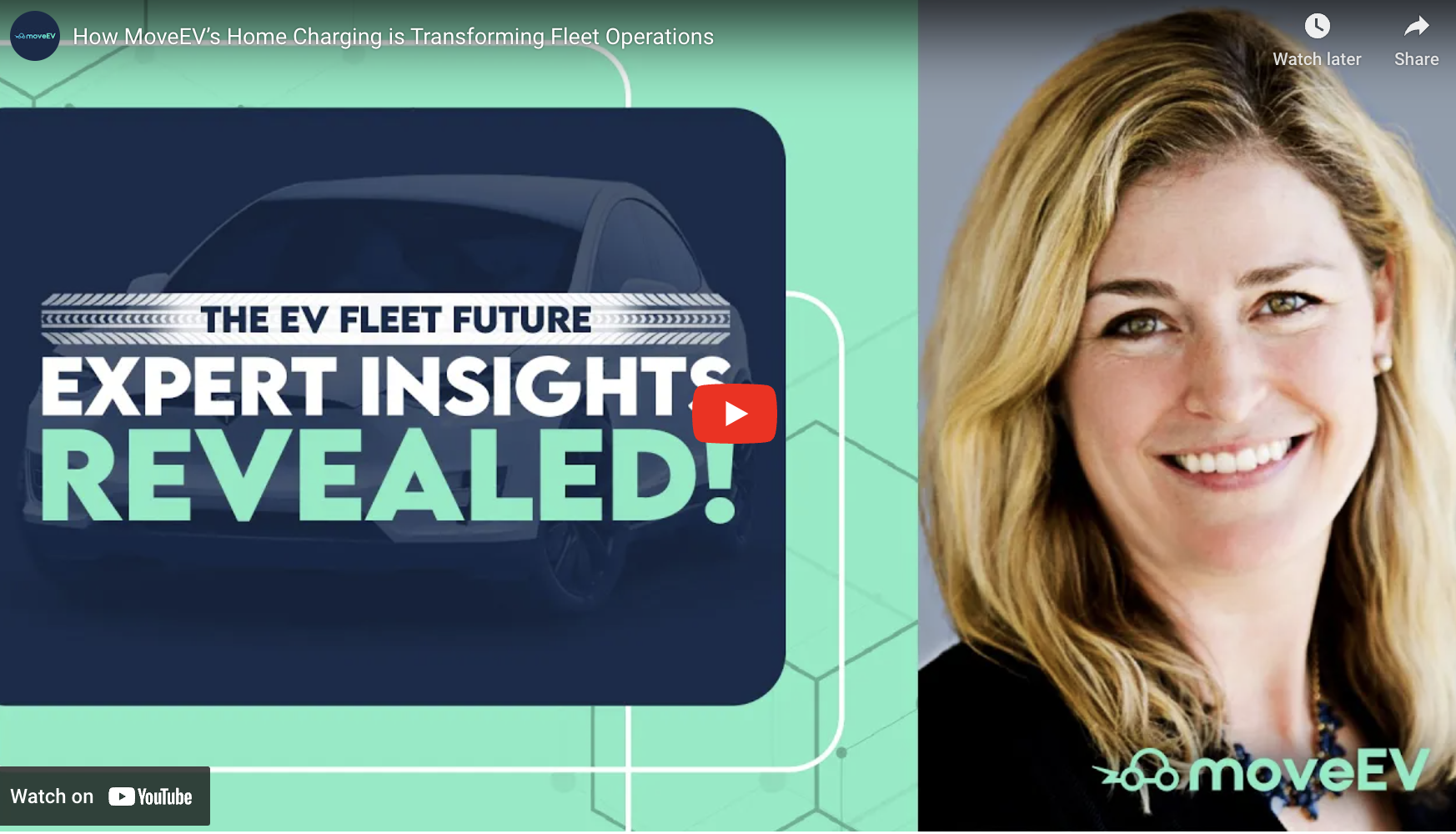
How MoveEV’s Home Charging is Transforming Fleet Operations
MoveEV's leadership team has decades of experience in fleet management. Watch this video for some quick tips on how to reduce your electric fleet vehicle costs and improve employee satisfaction.

Best Practices for Fleets Sending EVs Home to Charge
Automotive Fleet, a leading fleet trade outlet, has published an insightful article by our co-founder, Kate L. Harrison. In her piece, “How Fleets Can Minimize Risk When Sending Electric Vehicles Home To Charge,” Kate interviews EV legal expert Jason Goldfarb. This article offers valuable insights on managing risks when fleets send electric vehicles (EVs) home for charging. As the adoption of EVs grows, fleets face new challenges in ensuring safe and effective home charging practices. The article provides a comprehensive guide to navigating these challenges by recommending several key strategies to mitigate liability and risk.

David Lewis on EV Charging and Home Solutions with Fleet Auto News
David discusses the strategic approach U.S. fleets are adopting for electric vehicle charging, emphasizing the critical role of home charging solutions. He also discusses how understanding fleet needs and leveraging incentives can accelerate the transition. Discover how these factors are shaping the future of fleet management—read the full article now!

Fleet News Group Podcast: How ReimburseEV is Driving Home Charging Innovation Amidst a Shifting Political Landscape
in this podcast (transcript available here, as well) David discusses the strategic approach U.S. fleets are adopting for electric vehicle charging, emphasizing the critical role of home charging solutions. He also discusses how understanding fleet needs and leveraging incentives can accelerate the transition. Discover how these factors are shaping the future of fleet management—read the full article now!

MoveEV Joins the Black Fleet Network: Continuing Our Commitment to Diversity, Equity, and Inclusion
MoveEV is excited to announce our membership in the Black Fleet Network™ (BFN), reinforcing our commitment to fostering a more inclusive and equitable future in the electric vehicle (EV) industry. This collaboration highlights our dedication to bridging disparities, empowering diverse communities, and ensuring accessible opportunities for all within the EV sector. By joining BFN, we aim to drive innovation and support equity through initiatives such as internship programs and inclusive membership opportunities. Learn more about our DEI efforts and how your business can get involved.

Automotive Fleet Leasing Market to Reach $43.5B by 2032
Monitor Daily, a prominent equipment finance outlet, reports that the global automotive fleet leasing market is projected to reach $43.5 billion by 2032. The article highlights the increasing corporate preference for fleet leasing due to its cost efficiency and operational benefits. It mentions the integration of electric and hybrid vehicles to meet eco-friendly demands and the use of advanced telematics for real-time fleet management. The piece also notes Geotab Marketplace's partnership with MoveEV to enhance EV fleet management, reflecting the industry's shift towards sustainable practices.

Geotab Sustainability Alliance: The Power of Collaboration
In a landscape where sustainability reigns supreme, collaboration becomes our most potent tool for progress. At MoveEV, our partnership with Geotab's Sustainability Alliance Program is a testament to this belief. Through our home charging approach, we're streamlining the transition from gas to electric vehicles, ensuring fleets can embrace sustainability with ease. Together with Geotab and our alliance counterparts, we're not just envisioning a greener future—we're actively shaping it, one electric vehicle at a time.
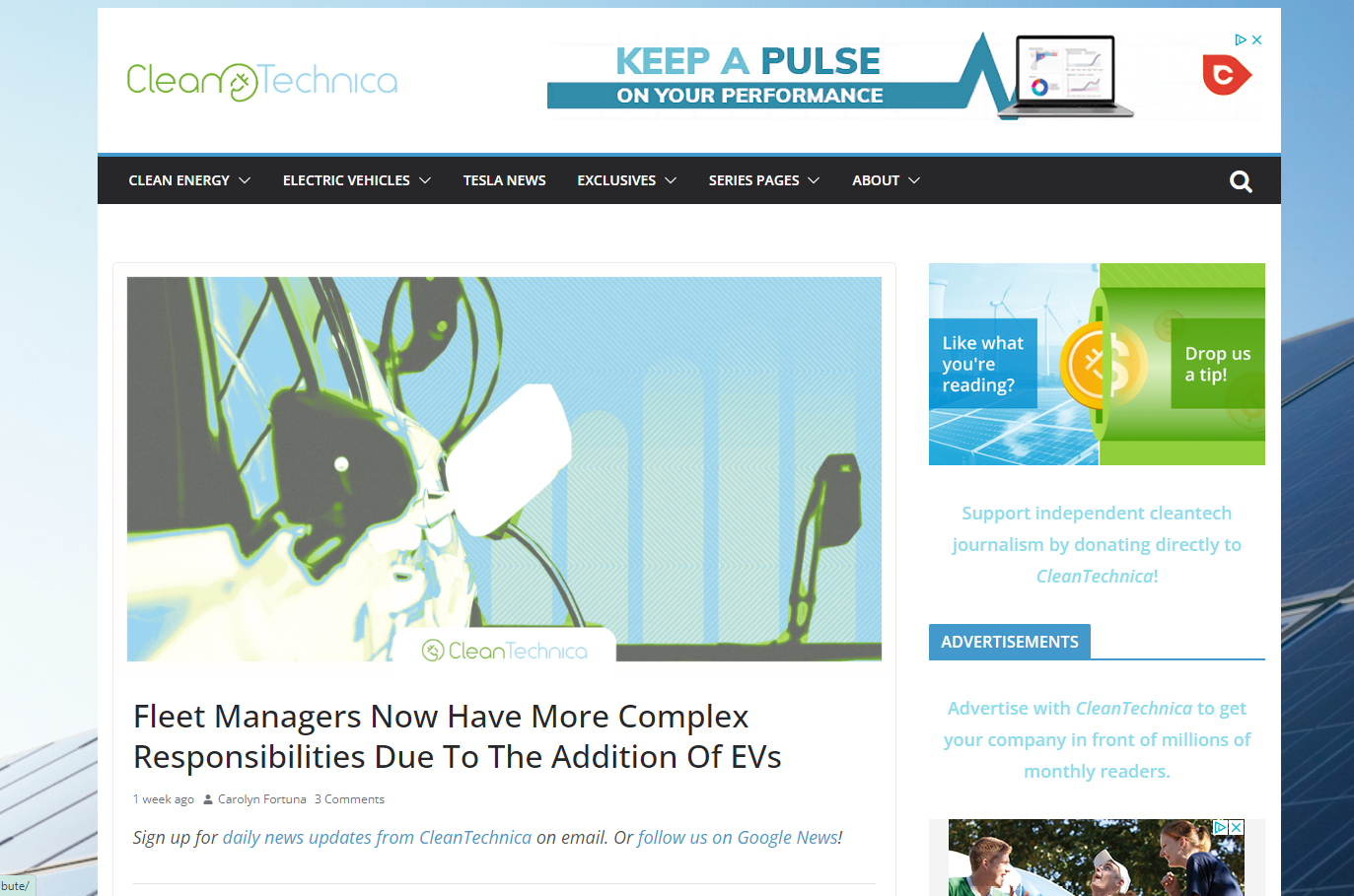
Fleet Managers Now Have More Complex Responsibilities Due To The Addition Of EVs
MoveEV’s founder, David Lewis examines the shifting responsibilities of fleet managers with the rise of electric vehicles (EVs). He explains the benefits of installing home chargers for employees, which can streamline operations and reduce costs. Lewis notes that low-mileage drivers can use Level 1 chargers, while high-mileage drivers benefit from non-networked Level 2 chargers, avoiding the costs and liabilities of networked options. Careful planning is crucial for cost-effective and flexible solutions tailored to fleet needs. Read more if you want to understand how to optimize your company's EV charging strategy.
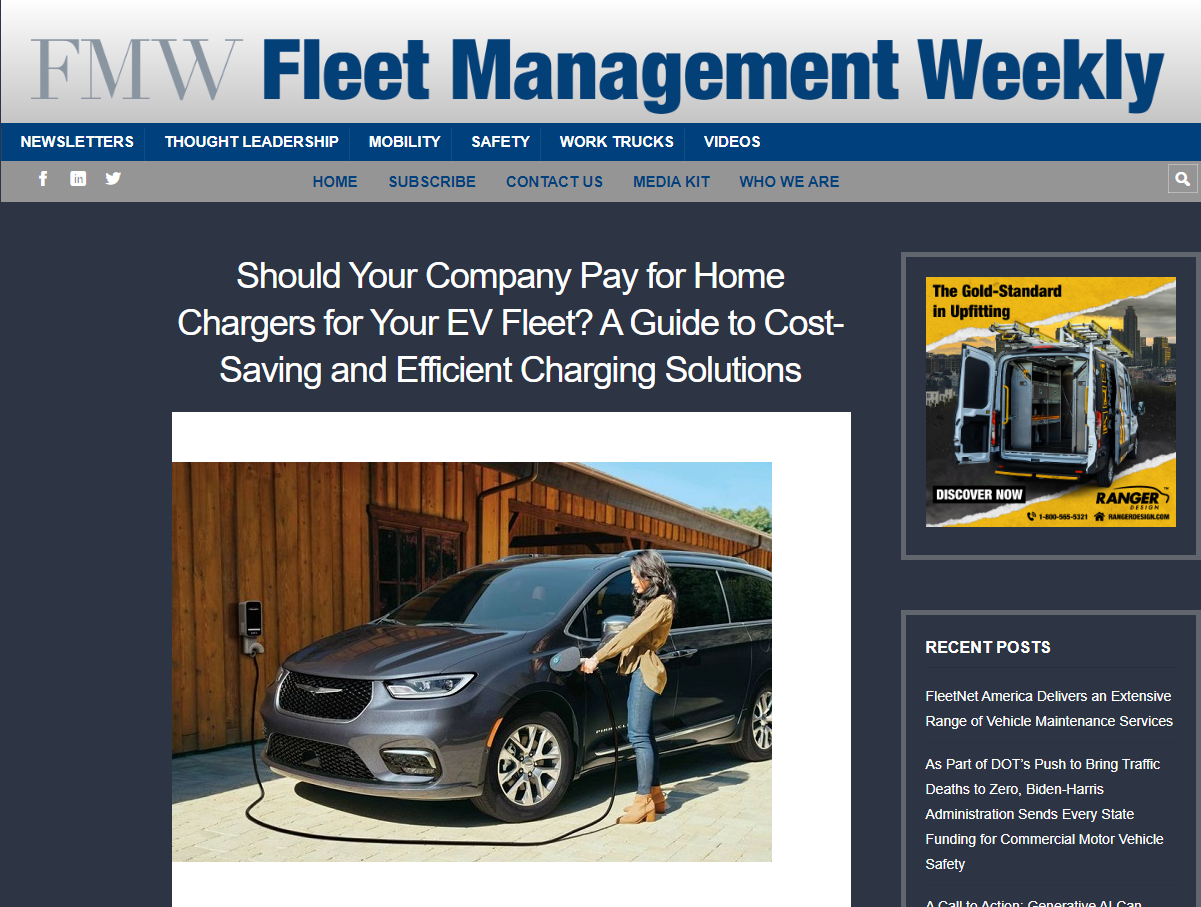
A Guide to Cost-Saving and Efficient Charging Solutions
Choosing the right kind of charging systems is crucial for fleet management. Considerable thought is necessary. Level 2 enables faster charging for high mileage users, while Level 1 offers simplicity. Chargers held by the corporation, however, come with expenses and upkeep issues. An organized process that evaluates fleet requirements, expenses, and scalability is essential to help lead this choice. A structured approach that evaluates fleet demands, expenses, and scalability is essential to help lead this choice. Ensuring driver pleasure and efficiency as top priorities ensures the best decision for a sustainable future.

MoveEV and Whip Around Add New Features to Geotab's Fleet Management Platform
Work Truck, a leading truck fleet trade outlet with a reach of 91.4K, recently featured an article on the Geotab Marketplace release. The article highlights how MoveEV and Whip Around are bringing new capabilities to Geotab’s fleet management platform. MoveEV offers tools to facilitate the transition to electric vehicles, while Whip Around provides advanced maintenance management features to ensure fleets operate smoothly. These enhancements aim to improve operational efficiency and streamline fleet management processes.
